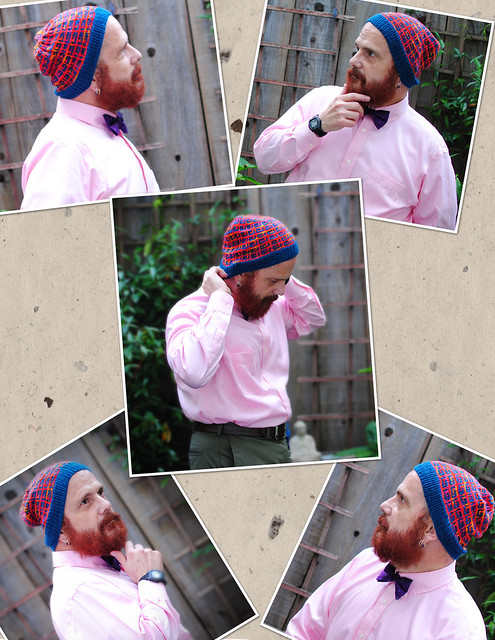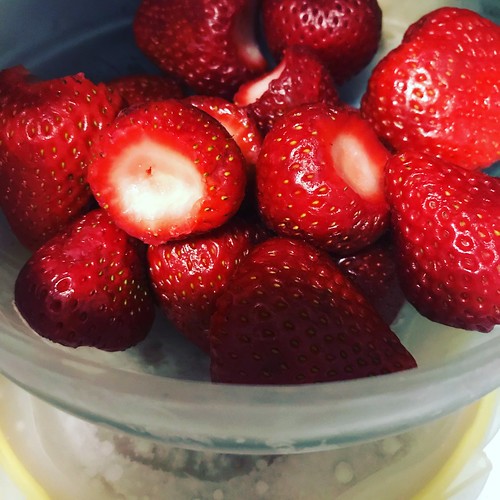
Centauro is the word in Spanish for a Centaur. A centaur is a
mythological creature with the upper body of a human and the lower body
of a horse. They are depicted with the hindquarters of a horse attached
to them. This half-human and half-horse composition has led many writers
to treat them as liminal beings, caught between the two natures,
embodied in contrasted myths, both as the embodiment of untamed nature,
as in their battle with the Lapiths (their kin), or conversely as
teachers, like Chiron.
The technique used in this pattern is of two-color slip-stitch knitting or Mosaic knitting. This is a charted Pattern, no written instructions are given. If you can knit simple stripes and slip a stitch, you have all the skills you need. Mosaic knitting involves using the main color for knitting while slipping the stitches of the complementary, contrasting or “other” color. If you are knitting the complementary color, you slip the main color; if you are knitting the main color, you slip the other color. This is another way of working with two colors, but one color at a time. No real floats or locking the unused yarn as you go.
Aside from the allure of color patterning using just one yarn at a time, slip-stitching has other advantages over other multicolor techniques: Mosaic knitting works well either flat or in the round which gives it more flexibility than intarsia or Fair Isle techniques.
Your work will be smaller than you think. When you block your piece, you will need to stretch it a little. This will help the slip stitches to come into form and settle. The hats that I have made with this technique in the round are usually smaller than expected, but do stretch after blocking.
The gauge given “Gauge: 2 “ = 16 Sts and 17 Rows in 1 x 1 ribbing st (adjust needle size to get gauge if needed)”. The gauge for Rows in mosaic knitting is a bit different. I found that mine was about 20 to 21 Rows per 2 inches after blocking, even though my ribbing gauge was 17 Rows per 2 inches. This is due to the fact that these slipped stitches make the fabric a little tighter on the vertical Axis.
Materials:
You will need a skein of each color, about 100 to 175 yds for MC, and 70 to 160 yds For CC.
Yarn: Main picture Above Medium hat, 126 sts 53 grams
Option 1: Wollmeise Sockenwolle 80/20 Twin by Wollmeise (MAIN PICTURE)
Fingering / 4 ply 80% Merino, 20% Nylon 510 yards / 150 grams
Hat at 126 sts MC Neptune 108 yards, 31 grams; CC Allegria 77 yards , 22 grams
Option 2: YOTH Yarns Little Brother (Page 4)
MC “Poppy Seed“, 100 gms,435 yds ; CC “Cracked Pepper“,100 gms, 435 yds grams
Fingering / 4 ply (14 wpi), 100 gms,435 yds;80% Merino,10% Nylon (Polyamide),10% Cashmere
Pattern Notes: If you substitute the yarn, go with Sport yarn with the same Wraps per Inch (WPI)
Needles: US 4, 3.50 mm double pointed needles or 1 or 2 circular needles with cable of 30 ” (or bigger if you are looking to make the hat using magic loop). At one point DPNs will be useful.
Gauge: 2 “ = 16 Sts and 17 Rows in 1 x 1 ribbing st (adjust needle size to get gauge if needed)
This pattern is available for $6.00 USD
The technique used in this pattern is of two-color slip-stitch knitting or Mosaic knitting. This is a charted Pattern, no written instructions are given. If you can knit simple stripes and slip a stitch, you have all the skills you need. Mosaic knitting involves using the main color for knitting while slipping the stitches of the complementary, contrasting or “other” color. If you are knitting the complementary color, you slip the main color; if you are knitting the main color, you slip the other color. This is another way of working with two colors, but one color at a time. No real floats or locking the unused yarn as you go.
Aside from the allure of color patterning using just one yarn at a time, slip-stitching has other advantages over other multicolor techniques: Mosaic knitting works well either flat or in the round which gives it more flexibility than intarsia or Fair Isle techniques.
Your work will be smaller than you think. When you block your piece, you will need to stretch it a little. This will help the slip stitches to come into form and settle. The hats that I have made with this technique in the round are usually smaller than expected, but do stretch after blocking.
The gauge given “Gauge: 2 “ = 16 Sts and 17 Rows in 1 x 1 ribbing st (adjust needle size to get gauge if needed)”. The gauge for Rows in mosaic knitting is a bit different. I found that mine was about 20 to 21 Rows per 2 inches after blocking, even though my ribbing gauge was 17 Rows per 2 inches. This is due to the fact that these slipped stitches make the fabric a little tighter on the vertical Axis.
Materials:
You will need a skein of each color, about 100 to 175 yds for MC, and 70 to 160 yds For CC.
Yarn: Main picture Above Medium hat, 126 sts 53 grams
Option 1: Wollmeise Sockenwolle 80/20 Twin by Wollmeise (MAIN PICTURE)
Fingering / 4 ply 80% Merino, 20% Nylon 510 yards / 150 grams
Hat at 126 sts MC Neptune 108 yards, 31 grams; CC Allegria 77 yards , 22 grams
Option 2: YOTH Yarns Little Brother (Page 4)
MC “Poppy Seed“, 100 gms,435 yds ; CC “Cracked Pepper“,100 gms, 435 yds grams
Fingering / 4 ply (14 wpi), 100 gms,435 yds;80% Merino,10% Nylon (Polyamide),10% Cashmere
Pattern Notes: If you substitute the yarn, go with Sport yarn with the same Wraps per Inch (WPI)
Needles: US 4, 3.50 mm double pointed needles or 1 or 2 circular needles with cable of 30 ” (or bigger if you are looking to make the hat using magic loop). At one point DPNs will be useful.
Gauge: 2 “ = 16 Sts and 17 Rows in 1 x 1 ribbing st (adjust needle size to get gauge if needed)
This pattern is available for $6.00 USD


